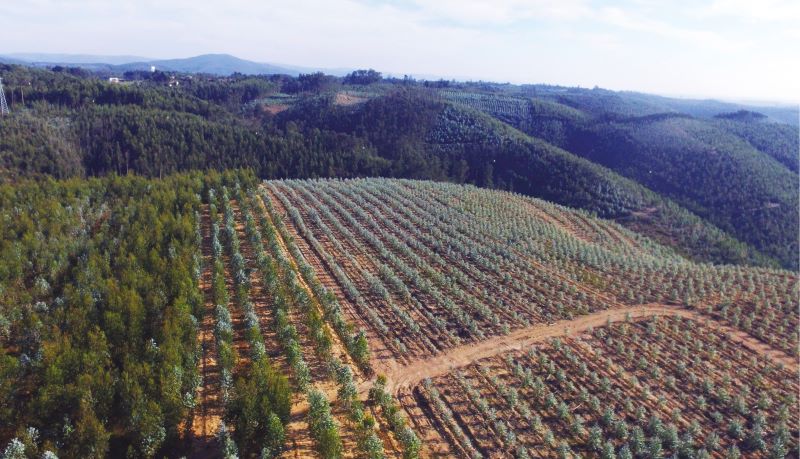The fire that devastated the municipality of Águeda in August 2016 left a deep scar on the landscape. More than seven thousand hectares were reduced to ashes, but the determination of local people was unscathed. In Castanheira do Vouga, three forestry producers refused to give up and in December that year they started a project that has transformed the landscape around them. Owners of small forest holdings, Pedro Ferreira, Henrique Oliveira and Paulo Cyhlar decided to pool their land and, by encouraging more of their neighbours to join in, created a combined forestry holding (CFH) of 11 hectares. With help and support from the Lower Vouga Forestry Association (AFBV), this project is aiming to be the embryo for rebirth of the region’s woodlands.
“CFHs are areas where we try to create economies of scale in forest management, because the main management problem is the small size of holdings,” explained Luís Sarabando, AFBV’s coordinator, who stressed the advantages of this project: “Mainly, it makes it easier to do the work, which saves costs, boosts yields and protects the environment. Good forestry practices also help to ease the pressure to use every square metre of woodlands.”
The producers involved are interested primarily in being ecologically responsible and minimising risks. “This allows us to cultivate the land intelligently,” said Pedro Ferreira. “Pooling the land doesn’t mean we stop being owners. With a larger area we have technical help that a small producer normally won’t enjoy, and the chance to do a proper plantation, clearing the undergrowth and paths around the boundaries. We can also keep a safe distance from some neighbouring plots, that aren’t cared for”, he added.
Better yields with certification
The main purpose of combined forestry holdings is to make woodlands more profitable and sustainable. “The work we do on these projects helps the process of forestry certification, which requires the producers who sign up to comply with specific standards and good practices,” explained António Guimarães, chairman of AFBV, who concluded: “Certification brings extra income that the industry is willing to pay, as a premium on top of the price, because on the international markets no one is going to touch a kilo of pulp or a pallet of paper if it’s not made from certified raw material.”
Aware of the economic importance of woodlands, and their potential for creating jobs, wealth and environmental value, local government is looking at combined forestry holdings as a solution for forest planning and management. The project in Castanheira do Vouga has been supported by Águeda municipal council, which has helped with access roads and paths through the land. Meanwhile, in nearby Vagos, the AFBV has helped to set up another CFH totalling nine hectares and thirty owners, with support from the local council, which has funded the introduction of indigenous species in plantations of fast growing trees.
“Landowners are our partners”
The pulp and paper industry attaches the greatest importance to combining forestry holdings, as a way of overcoming management problems in smallholdings. “The Navigator Company has worked to develop forests and support landowners. This is a growing industry all round the world and one of the soundest sectors in the Portuguese economy,” said José Luís Carvalho, Navigator’s coordinator for Forestry Innovation and Development, who added: “Forestry producers are our partners in this process and the industry doesn’t just guarantee purchases of certified wood, it is also willing to provide technical support. Our help is more effective when holdings are combined. It’s not bigger areas, but better areas, that lead to improved yields. The yields are much better when the forests are properly cared for and organised.”
The purpose of CFHs is to create economies of scale in forest management, thereby helping smallholders
